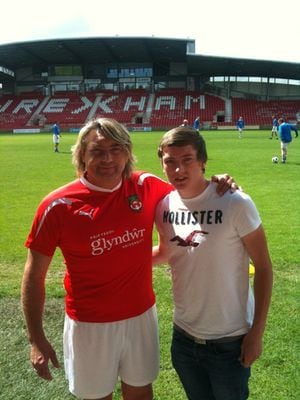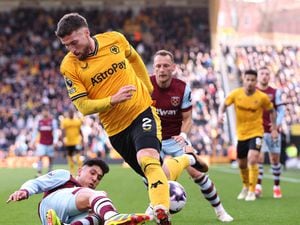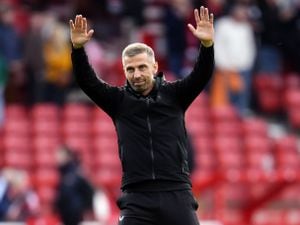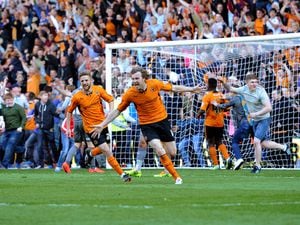One-game Wolves wonder Darren Wright living his Cornwall dream
With the welcome return of some warmer weather, and the potential pitfalls around travelling abroad, the likes of Cornwall are sure to be popular holiday destinations this summer.
Late night walks down sun-kissed sandy beaches, a glass of wine or bottle of Korev, wonderful views of rugged coastlines, a lively surf for those who are that way inclined.
The stuff that dreams are made of.
Unless you are lifelong Wolves fan and former apprentice Darren Wright.
Because for Darren, those dreams are now a permanent reality.
Several years ago, the Tipton-born former Molineux Man took the plunge to follow up years of holidaying in the South West by moving lock, stock and barrel for a new, and quieter life.
Wright, his wife Vanda and children Jessica and Lewis jointly acquired a plot of land with in-laws Wendy and Melvyn, covering an acre near the village of Charlestown, two miles from St Austell.
The derelict cottage was renovated for Wendy and Melvyn to live in, and the Wright family then had a new house built on the land. Job done, ambition realised.
What then was Wright’s dream? Well that was probably fulfilled over three-and-a-half decades ago, not too far up the road from his Cornish home at another home - Home Park in Plymouth.
There are a few among the 1049 players to have represented Wolves in a league fixture whose experience was confined to one solitary appearance.
And one of those, is Wright.
He was a 17-year-old apprentice at the time, having originally signed schoolboy forms several years earlier after being spotted playing local junior league football by scout John Jarman.
Frank Upton was then the Wolves Youth Development Officer, and transformed Wright, who had previously operated as a midfielder or striker, into a defender.
As a schoolboy, Wright would head to training at Castlecroft when possible, usually in the holidays, attend training camps at RAF Cosford and play for the Intermediate team on Saturday mornings.
“At first it was a lovely time to be involved, with Wolves in the old First Division,” Wright recalls.
“It felt like the level of the support, and the stature of the club, was just as it is now.
“But then, as I moved towards becoming an apprentice, things started rapidly going downhill!
“The club started struggling, and some of the things we used to see were a bit lively.
“The PFA were sometimes paying players’ wages and the dressing rooms were in a state.
“I remember coming back from midweek reserve fixtures away from home when we would be back at Molineux in the early hours and would unload the kit into the changing rooms.
“As we walked in there would be a massive scattering of cockroaches running off here, there and everywhere!
“But it didn’t matter to us at the time, it was an honour and a privilege to play for the club.
“I was brought up in Great Bridge in Tipton where you were either a Wolves fan or an Albion fan and for me it was Wolves.
“I used to go to the games as a kid, standing on the South Bank with my Dad and my mate who lived next door, and was at Wembley for the 1980 League Cup Final.
“So being taken on by the club was the dream of every lad like me - my heart definitely ruled my head!”
Even before his first team bow, Wright had enjoyed a little taste of potential footballing stardom when called out of a physics lesson at school to head to Molineux to play for the reserves.
“My mates were looking at me like I was from another planet as I grabbed my stuff and walked out of the lesson,” he says with a chuckle.
A few hours later Wright was lining up for the second string as a 15-year-old against Coventry, marking former Wolves frontman Bobby Gould.
There was another occasion when Wright had played for the youth team on a Saturday and was recuperating with a sandwich and glass of pop down the road at the Goalpost pub when he was tracked down by coach Greg Fellows and put on standby to be on the bench for the first team that afternoon.
As it was, Mick Coady overcame a bout of sickness to take his place as a substitute and Wright was stood down from duty.
Ironically, it was another reserve game against Coventry not long afterwards, when Wright was up against winger Dave Bennett, that paved the way for that precious first team breakthrough.
“Bill McGarry was the manager then, in his second spell at the club, and he had watched the reserves and afterwards told me I was travelling with the first team the following weekend,” says Wright.
“It was a strange one as we were playing a friendly against Truro City the day after the Plymouth game and I thought I was travelling just to carry the kit and stuff and then play in that one instead.
“It got to the Friday night, at the Holiday Inn in Plymouth, and the gaffer told me to watch what I was eating and drinking as I was going to be playing the next day.
“I was straight on the phone to my Mum and Dad as you can imagine!
“I can still remember running out before the game to do the warm-up and seeing the fans behind the goal, where I would have been watching myself just a few years earlier.
“It was so surreal to be running out with the shirt on getting ready to play a first team match for Wolves, almost unbelievable really.”
The game itself didn’t quite live up to the dream.
Wolves were by now in Third Division, two-thirds of the way through their rapid descent from First to Fourth, and ended up on the wrong end of a 3-1 defeat.
Wright, at full back, found himself up against Garry Nelson, the burgeoning winger who would go on to hit the heights with both Brighton and Charlton.
Even at 17, Wright wasn’t shy, and in delivering an early ‘reducer’ on Nelson found himself booked inside a quarter of an hour.
“That was one thing Frank Upton always said to me, to make sure I got onto the winger, let him know I was there,” he explains.
“At half time the gaffer was actually having a go at the more experienced lads for not protecting me a bit more.
“I just remember coming off the pitch feeling really disappointed about the result, losing on my debut, but thinking I would need to pick myself up pretty quickly.”
Neil Edwards grabbed Wolves goal on the day and the team included a mix of youth – such as Tim Flowers, Paul Dougherty and Danny Crainie – and experience, including Alan Ainscow and Andy King.
Little did Wright know when walking off the pitch that it would prove his one and only taste of life in the Wolves first team.
By the time of the next game Ricki Herbert had recovered from injury, although there was perhaps a sign of how highly McGarry rated Wright in that he sat with him watching the home match with Lincoln and talking him through the tactics.
“At 17, I’ve made my first team debut, and am kind of thinking this is the start of my career in football, my career with Wolves,” Wright recalls.
“But things often don’t work out like that, in football it changes dramatically in no time at all, and I never played for Wolves again.
“There were a lot of changes at the club and that was it really – my time was over.
“We got to the end of the season and Sammy Chapman, who had coached me in the youth ranks, had taken over as boss.
“I knew Sammy well as I was good mates with his lads Campbell and Cavan and thought I might have a chance of a pro contract but whether he had his hands tied because of the financial situation I don’t know.
“Ultimately there were five or six of us apprentices, and none of us were taken on – it was the end for all of us in terms of any hopes of a career at Wolves.”

For Wright however, in terms of regular football, his fortunes were soon looking up as he was snapped up by Wrexham, in the old Fourth Division, but also involved on several occasions in Europe by virtue of winning the Welsh Cup.
He remembers a Cup Winners Cup trip to Malta, to take on Zerrieq, and then Spain, against Real Zaragoza, as well as Manchester United, not to mention playing alongside the likes of Joey Jones, Alan Kennedy and Barry Horne.
The Wrexham physio at the time was actually former Wolves title and cup winning hero George Showell.
“On my first day he found out I was from Tipton and he said he was from Bilston so I’d be alright with him,” Wright says with fond memories.
“George really took me under his wing and kept an eye on me thanks to that Wolves connection.”
As irony would have it, it was a completely fair 50-50 tackle with another future Wolves connection Mark Rankine – there was no malice and the two have since spoken regularly – that caused an injury from which Wright was unable to recover sufficiently to play at league level, ultimately prompting a move into semi-professional football - and the working world - at the age of just 23.
Wright has only ever had three jobs away from football, first with a security company and then in delivery with DPD and now APC.
Yet even when juggling those roles with footballing commitments he was still able to enjoy some more on-pitch success, especially with Cheltenham Town at the start of the Steve Cotterill era which took the club into the league as well as winning the FA Trophy.
Wright had been taken to Cheltenham by Chris Robinson, who he had played for at Worcester City, but stayed on under Cotterill to play a pivotal role in the promotion from the Southern League Premier which paved the way for that final push for the league.
There were other spells on the Midlands circuit with Willenhall Town, Stafford Rangers and Halesowen Town, the latter in the same team as former Wolves favourites Paul Birch and Robbie Dennison.
Finally Wright decided that it was time to hang up his boots, although, alongside his ‘day job’ with APC based out of offices at Saltash near Plymouth, he has never cut his footballing ties completely.
He actually coached with Wolves Development Centre for a time, working with Marc Campbell and renewing acquaintances with former Wrexham pair Steve Weaver and Darren Ryan.
“I really enjoyed going back to Wolves for a time and the facilities and training ground are unbelievable now,” he enthuses.
“It’s a different world to when I was there as a player!”
Having completed his UEFA ‘B’ qualification, Wright has also coached with Rushall Olympic and Continental Star whilst also, particularly apt ahead of the big Euro 2020 kick-off, has been involved at a major international tournament.
ConIFA is the Confederation of Independent Football Associations, the governing body for teams and countries not affiliated to FIFA and therefore not eligible for their competitions.
For Wright, it is about helping individuals or countries who maybe don’t have a voice or are too small to be fully represented by the game’s existing mainstream authorities.
He answered an approach to get involved with coaching the Panjab team, made up of UK-based players from India and Pakistan, working with manager Reuben Hazell – nephew of the legendary Bob, so another Wolves connection – and Delton Francis.
Building up the squad, and adding experience to an array of young talent, the backroom staff took the team to the 2016 ConIFA World Football Cup in Abkhazia, an autonomous republic in North West Georgia.
Not only that, but they also took them all the way to the final, before conceding a late equaliser and losing on penalties to the host nation at the Dinamo Stadium.
“It was a great experience,” Wright recalls.
“Abkhazia is quite small, only as big as a city really, but there must have been about 25,000 crammed into this small stadium for the final.
“The President of Abkhazia was there with a full entourage, and our lads did really well throughout the tournament to make it to the final.”
Two of those involved with the Panjab team were twin brothers – Amar and Arjun Purewal – who made history just a few weeks ago by lining up on opposite sides for Hebburn Town and Consett in the FA Vase Final at Wembley.
Ultimately Wright moving to Cornwall meant he was no longer able to work with the Panjab team but, with his new location, a similar opportunity soon came knocking.
Jason Heaton and Andrew Bragg set up the Kernow Football Alliance, which has the blessing of the Cornwall County Football Association, and Wright became involved on the coaching side of a team managed by Phil Lafferty and Darren Gilbert.
Covid-19 and his own circumstances have slightly curtailed Wright’s contribution in recent times but he is still very keen to remain involved with Kernow, and help harness the ability of players from such a huge and sometimes untapped footballing region.
“I think there is a real platform for football in Cornwall and it is getting bigger,” says Wright.
“Jack Stephens, who plays for Southampton, is Cornish, and Chelsea also have a development centre running at a college in Truro.
“It is about trying to tap into the market as while Plymouth, Exeter and Torquay aren’t all that far away, there are certainly some good players down here who deserve some representation.
“The Kernow team was going really well and was aiming to be involved in the ConIFA competitions although it has been affected by Covid as both the European Championships and World Cup got cancelled.
“Hopefully these opportunities will come around again and I will be involved in it as long as I can.
“The body is telling me to stop as I’ve had a left knee replacement and am due the same on the right so there is a lot of wear and tear.
“But as long as I can keep moving around I will keep doing it – it’s really nice to give something back.”
And health is certainly an issue which has grown in importance for Wright in recent years given he actually suffered a heart attack while playing a charity game for Wrexham Legends back in 2014.
“I was coming off towards the end and really didn’t feel well, to the extent that I couldn’t even get to the edge of the pitch,” he describes.
“I didn’t collapse, but just sat down and literally could not move.
“Fortunately there were two nurses in the crowd who looked after me and immediately said they thought it was a heart attack.”
One of Wright’s arteries had collapsed, requiring the insertion of a stent but, with his general good health and levels of fitness, he has fortunately made a full recovery and has not had a problem since.
No doubt the sea air and gentler pace of life in Cornwall also plays a positive contribution.
“It’s beautiful down here,” Wright assures.
“It was one of those situations where we always used to come down on holiday and just kept saying imagine if we could actually go for it and live here permanently.
“From the initial conversations, and us being able to sort out work and somewhere to live, it probably took about five years, and I even had to commute for a couple which was tricky.
“But we have got there and now are really fortunate to have a nice house and nice garden, in a really amazing area to live.
“I know the pandemic has been really tough for so many, but we feel really lucky as there is so much distance between people down here, you can isolate yourself away anyway and you wouldn’t even know anything else is happening.
“We live about ten minutes away from five different beaches and our nearest is Carlyon Bay, which is stunning.
“When I first started out at Wolves I was probably living the dream and thinking I might go on and be able to buy a house on Perton Ridge – well it kind of feels I have got there now in a very roundabout way!"
Those Molineux memories continue to linger, whether via regular chats with former team-mate Dean Edwards and others, or keeping track of the club’s current fortunes on TV.
“I still absolutely love the club and watch them like a fan even though I actually played for them,” Wright insists.
“It has been a great few years with Nuno and to be honest I am a bit disappointed he has gone but I am sure the owners have a plan and hopefully it will work out.
“Wolves is still a result I always look out for, even when I was playing for Wrexham it was, and I even had to play against them a couple of times.
“I stayed with my Mum after the game at Molineux and one of my old schoolmates actually came and knocked the door to ask me what I was doing as he hadn’t even realised I had left!
“I still get people messaging me on Facebook saying just what they would have given to have played just one game for Wolves, and that sums up exactly how I feel.
“Of course I wish it could have been more, and of course I wish it had been at Molineux rather than away at Plymouth.
“But it was still an unbelievable feeling and one I will never forget.”
So while he might have moved from golden colours to golden beaches, and his moment in the Wolves sun is now almost 35 years ago, for Wright, Darren’s Day in Plymouth is one he will always cherish.





